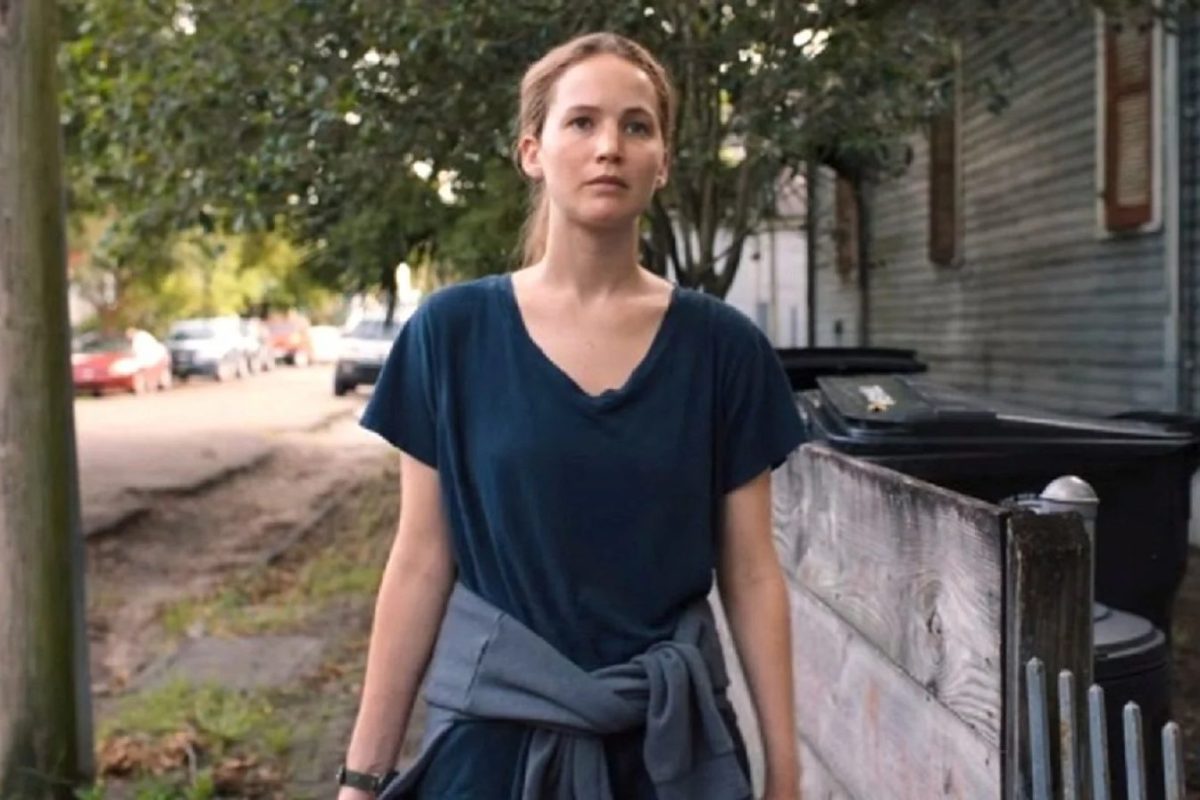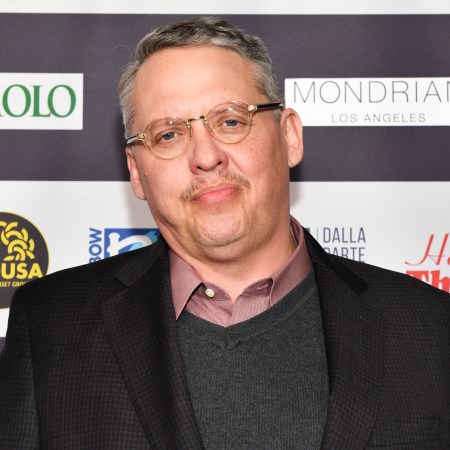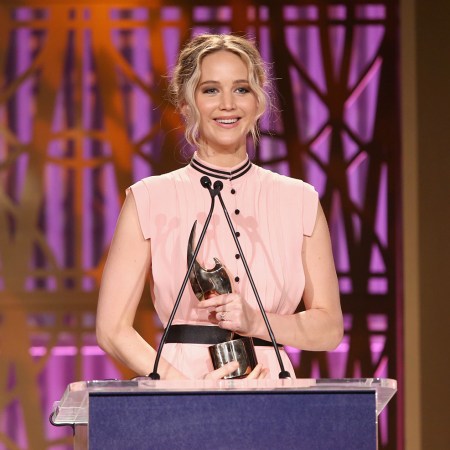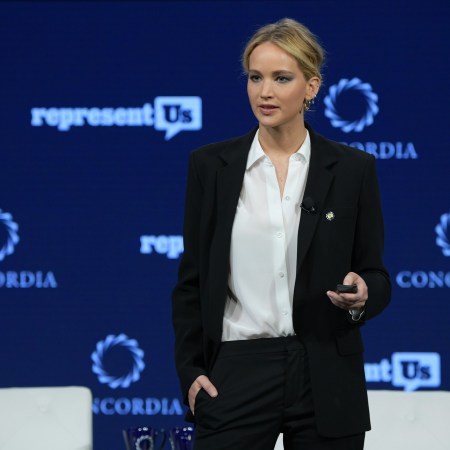Jennifer Lawrence is back, and she’s smaller than ever! That’s the unusual, unofficial selling point of Causeway, an intimate new film that just debuted, with appropriate quietude, on Apple TV+. Lawrence has spent much of the past decade since the first Hunger Games movie as one of the biggest young stars in the world. This makes Causeway — not quite a two-character drama, but close to it, about an Army Corps of Engineers vet coming home after a traumatic brain injury in Afghanistan — look like a reset, jumping all the way back to Winter’s Bone, the stark backwoods noir that occasioned Lawrence’s first Oscar nomination. (She’s since been nominated thrice more, and won once.) It’s a good film, and Lawrence is good in it, even as it plays like a self-conscious abdication of her star power.
In recent interviews, Lawrence has talked about some of the recent career choices that led to her taking a break from acting, with the sci-fi drama Passengers and the dwindling-returns X-Men series cited as projects her former management encouraged her to stick with, despite her instincts. (It’s a part of nearly every modern movie-star media blitz: the contrition for projects that didn’t quite work.) The truth is, even Lawrence’s proudest moments — the blockbuster Hunger Games quartet and her three Oscar-nominated turns in David O. Russell movies — have felt neatly organized, even by the standards of an image-conscious star. In 2012, she starred in The Hunger Games and Silver Linings Playbook, winning an Oscar for the latter. In 2013, she was in The Hunger Games: Catching Fire and American Hustle, receiving an Oscar nomination for the latter. In 2015, the final Hunger Games movie was paired with Joy; the Oscar nom arrived on cue, even as the movie left some befuddled. Several of her other movies from this period are, essentially, extensions of this Katniss-and-prestige strategy: Her action-star turns as Mystique in the X-Men prequels supplementing her main franchise, and the chaos of Darron Aronofsky’s Mother! serving as a nightmarish riff on the loudly fractious families of her films with Russell.
All of this allowed Lawrence to often feel like the wild card in her own relatively schematic filmography. The Hunger Games films are well-made, but would they register as several cuts above the YA-adaptation glut of that era without Lawrence bringing such vivid emotion to the part of Katniss Everdeen? For all of their big-budget scope, the most memorable image of the series is the shot that closes Catching Fire, of Lawrence’s face turning from shock to rage to resolve. Her heavily awarded work in the Russell movies is wilder: Cast in a series of parts increasingly unmoored from her actual early-20s age, she spins kind of a screwball variation on her Winter’s Bone/Hunger Games steeliness, whether out-maneuvering the superstitions of the OCD Eagles fan played by Robert De Niro in Playbook or vengefully singing along to “Live and Let Die” while dolled up for housework in Hustle. If these performances flirt with too-muchness, that’s part of the thrill: watching an intensely charismatic performer test the boundaries of what she can get away with, possibly transcending good sense along the way. Even in the X-Men movies, where Lawrence is often dismissed as a checked-out check-casher, her Mystique is consistently glamorous, shapeshifting from nude, blue ass-kicking to stylish variations on the “real” J-Law in X-Men: Days of Future Past and X-Men: Apocalypse. In Apocalypse, Mystique has reluctantly become a symbol of mutant freedom and pride; the arc of these movies is Lawrence becoming someone whose face would go front and center on a poster.
The 2022 InsideHook Holiday Gift Guides
A one-stop holiday shopLawrence’s star has arguably dimmed slightly in the past five years, and it’s instructive to look at the two non-auteur, non-franchise titles that contributed to this: The aforementioned sci-fi romance Passengers and the dark, trashy spy thriller Red Sparrow. They’re both star turns; in Passengers, she’s a woman so alluring that the Chris Pratt character wakes her up from cryo-sleep on a long space mission, just to make time with her, while Red Sparrow has her playing a dancer who turns to espionage by sheer force of will. But these slick productions don’t give her much to brace against; the tension between her mark-hitting professionalism and free-spirited unpredictability vanishes. Both movies, to varying degrees, treat her as just another beautiful body.
Causeway, then, seems explicitly designed to remind us of Jennifer Lawrence the great actress, moreso than J-Law the beloved (and then backlashed) celebrity, star and talk show personality. And it does the job, as director Lila Neugebauer gives Lawrence plenty of space without putting her through too many melodramatic motions. Lawrence plays Lynsey, a military engineer undergoing a long physical and mental recovery from a major brain injury, experiencing frustrations with her newfound limitations and her grudging return to a dead-end life she was willing to face great danger to escape — the plight of the post-9/11 soldier seen in plenty of other coming-home narratives of the past two decades. If Lawrence’s David O. Russell characters are notable for their willingness to say and do boldly impolite things, Lynsey is someone dealing with this quality as an unwelcome intrusion: Early on, there’s a slow, mortified realization that she’s described a temporary’s caretaker life as “miserable” out loud, rather than thinking it; her injury has left her with some trouble processing the difference. It’s a different, far less intoxicating form of showing her unvarnished self.
Lawrence has no trouble dialing back; her performance is all about Lynsey attempting to restrain herself in an already-constrained situation, trying to act like she’s healing and adapting, figuring out when to strategically deploy the signs of struggle she tries to hide. It’s an admirable bit of concealment from a star whose image has often played at open-book approachability. It’s also a little, well, conventional. Lawrence can no longer be her movie’s not-so-secret weapon; in Causeway, that distinction belongs to Brian Tyree Henry. He plays James, a man quietly reeling from his own personal tragedy, whose newfound friendship with Lynsey somewhat resembles the self-medication he clearly practices on himself: relaxing and potentially dysfunctional. Their bond teases the human volatility out of familiar material. The struggle between human behavior and checkmarked story elements emerges as the movie goes on. By the time it reaches a slightly open ending, it’s as if the movie is offering the least it can do to introduce a little ambiguity here and there.
Respectable as Causeway is, there are times when it also feels a bit like penance from Lawrence — a make-good for daring to apply her talent in unserious ways, for having fun as a movie star. Look at her Don’t Look Up co-star Leonardo DiCaprio: He certainly has his self-serious projects, but many of his tortured heroes, anti-heroes and outright villains also have the verve of joyful performance. Lawrence can ace an assignment like Causeway, but wouldn’t it be more thrilling to see her version of The Wolf of Wall Street, The Great Gatsby or Once Upon a Time… in Hollywood? (Don’t Look Up was ultimately a bust for both of them, through no fault of either.)
Lawrence may be afforded that luxury again; her next project, her first outright broad comedy, may even go further. In the meantime, she obviously believes in the value of Causeway, which does dovetail nicely with Winter’s Bone. It’s almost an alternate future for Ree, the resourceful teenager born into poverty — which is also what makes it seem, for the moment, like Jennifer Lawrence moving back, trying to recapture an austerity that no longer fits.
This article appeared in an InsideHook newsletter. Sign up for free to get more on travel, wellness, style, drinking, and culture.
























